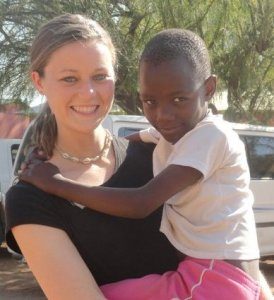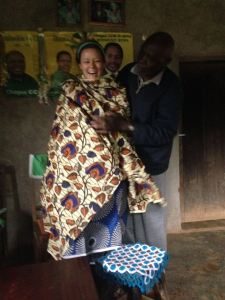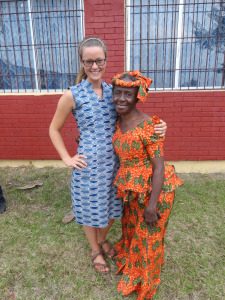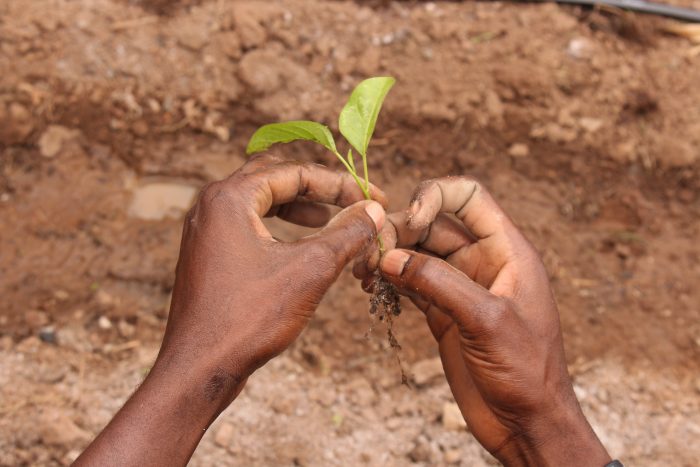I was sitting in the soil science lab grading papers when one of my Liberian colleagues struck up a conversation with me. It started out with him noticing that I was once again wearing a lappa outfit (lappa is the African fabric) and him teasing me and saying how much of a Liberian I have become. I dress like a Liberian, I can cook like a Liberian, I understand the Liberians when they talk, and I can even talk like a Liberian small small (Liberian for “a little bit”). He said when people see you wearing these clothes and talking like you do now they will ask “why have you changed? Where is it that this woman has come from? Then he asked me “when you go back to America, what will you tell the people about what you have seen here? What news will you share? What is your favorite thing about this place that you will carry back?”
 There are so many things I love, but the first thing that I thought of naturally was how generous everyone is and how welcoming people are, I mean strangers will offer you food if you happen to walk by and they are eating. My colleague agreed with me and then went on to keep giving examples of how generous and caring people are here. If you are about to leave a taxi and then realize you forgot to bring enough money with you to pay, someone else in the car will step in and pay. If you see someone on the side of the road crying, a Liberian will stop and see if they are ok and do anything to help them get back on their feet again. If someone asks you for food, you will not think twice aboutsharing. I agreed of course with everything he was saying and I continued to list off more things that I love…the clothes, the music, the food, the street vendors, the scenery, the jokes, the traditions, little Liberian sayings, and so much more. It was a jovial conversation, he and I were just laughing about all the beautiful things in Liberia and how he could see I had slowly grown accustomed to his way of life. He didn’t say it, but all throughout the conversation it was easy to see how proud he was of his country and perhaps how glad he was that I saw it too.
There are so many things I love, but the first thing that I thought of naturally was how generous everyone is and how welcoming people are, I mean strangers will offer you food if you happen to walk by and they are eating. My colleague agreed with me and then went on to keep giving examples of how generous and caring people are here. If you are about to leave a taxi and then realize you forgot to bring enough money with you to pay, someone else in the car will step in and pay. If you see someone on the side of the road crying, a Liberian will stop and see if they are ok and do anything to help them get back on their feet again. If someone asks you for food, you will not think twice aboutsharing. I agreed of course with everything he was saying and I continued to list off more things that I love…the clothes, the music, the food, the street vendors, the scenery, the jokes, the traditions, little Liberian sayings, and so much more. It was a jovial conversation, he and I were just laughing about all the beautiful things in Liberia and how he could see I had slowly grown accustomed to his way of life. He didn’t say it, but all throughout the conversation it was easy to see how proud he was of his country and perhaps how glad he was that I saw it too.
But then he got serious and he asked me in a very slow and thought out way “Fefe (my Liberian name meaning “breeze”), why don’t people in your country know about Africa? Why don’t you learn about Africa in your schools growing up? Does the news not cover Africa in your country? We in Liberia learn all about your country, your history, and your traditions and we always know the news going on in the US, so why don’t U.S.-Americans know anything about Liberia? It was clear that to him, the idea of how a continent with a culture, tradition, history, landscape, and people as beautiful and as rich as this could be unknown or ignored, is simply and honestly incomprehensible, inconceivable.
Taken aback by the directness and frankly the rawness of his questions, my confident little self just wanted to fill the silence with words and so I just started mumbling out a series of half-truths that I thought might be able to reasonably explain why the United States seemingly doesn’t have interest or doesn’t know about Africa. Sure we all know about one part of Africa- the poverty part- from all the iconic photos/commercials of starving babies with swollen bellies covered in flies lying in a mud hut. But that’s not all Africa is, that’s not the whole story. What about the other parts of Africa? The good parts, the beautiful things, the rich culture, the music, the fashion, the art, the science, the businesses, the life-changing ideas, the creativity, the boldness, the kindness, the deep love, the unbelievable faith, the beautiful traditions. I tried to explain myself, I tried to defend my country and the fact that I didn’t learn about any of these things with just a series of excuses… “Oh, we just don’t have time to learn all that, we just have so many things to learn about” and “and “it’s not that we are purposely leaving Africa out, it’s just that we don’t spend a lot of time…..” And then I just had to stop myself and say “I don’t know” as if I was just as confused myself why a lot of the world didn’t know about Africa. But the truth is, I had a sneaking suspicion that maybe I did know…
I sat there and a flood of guilt washed over my consciousness as I realized that the only answer that kept coming to my mind was “because Africa doesn’t matter.” I was shocked when I heard myself think those words. I cringed as those words kept creeping up in the back of my mind and like a person who had just had all their intimate belongings accidentally spilled out on the floor of a public place awkwardly rushes to pack everything back up before someone sees it, so I too hurriedly and awkwardly tried to shove those words “because Africa doesn’t matter” back down into the depths of my subconsciousness and run away as fast as I could from my own mind. Where did those thoughts even come from? How did they get there? How long had they been there? Did I put them there? Do I really believe that? How long did it take for those words “because Africa doesn’t matter” to form in the back of my mind? Less than a millisecond! It was already there somewhere inside me, ingrained in me despite the fact that I’d been talking about the importance of Africa for years in school and at church, despite the fact that I thought I was just talking about how much I supposedly loved Africa, despite the fact that I live in Africa….What?? How?? Why??? But, back to the real problem at hand, how do I answer that question now? How do you tell someone to their face it’s because they don’t matter? 
You don’t, obviously and it’s not true, obviously. But it got me thinking…is it that Africa really doesn’t matter or is that many of us just don’t know about Africa and therefore it seems that Africa doesn’t matter? Should we be expected to know (or even desire to know) everything about every country in Africa, or even the world? Surely, it’s not possible! I know that! And is the fact that we don’t know much about a continent saying that we don’t care? Because if that’s true, then that is saying that I don’t care about a lot of people in a lot places because there is ohhh so much about this big big world that I don’t know! What is it then? Why did those thoughts “Africa doesn’t matter” even appear in my brain? Is there a part of me that believes that Africa doesn’t matter? Why?
It was at that moment that I realized that just because it might have been an answer- “because Africa doesn’t matter”- doesn’t mean it was necessarily true. Plenty of people know that Africa matters, I know that Africa matters and I know that if you are reading this blog that you think that Africa matters too. But unfortunately, it is my belief that there are other forces telling us that Africa doesn’t matter and sometimes we can be tricked into believing the lie, a lie that part of me still maybe believes to some small extent. This lie doesn’t just come from one source and this lie isn’t something that is always obvious to see, but nonetheless, it is my belief (maybe I’m wrong) that it is still there like an undercurrent steadily beating beneath the surface of our society, unrecognized and unknown…this lie that “Africa doesn’t matter.” A lie that we have been told subtly by the media who never really spend any time covering African news (no it’s not entirely the media’s fault…I wish it were that easy to explain); by our education systems that are often lacking when it comes to teaching us about countries other than our own (the world has only recently begun this rapid globalization phenomenon and so can they really be blamed? Besides, I think that this is already changing in schools now); by the economic systems that always seem to inadvertently oppress and forget about Africa’s needs; by our international policies that say “America first,” which, perhaps driven by our own fears of the unknown, might lead us to conclude that one person’s life and well-being is more valuable than another person’s just because of where they were born; by our own shame used to hide/cover up our complicated history with Africa; by our trade policies that exclude rather than include; our aid/charity agendas that sometimes are manipulated to serve our own needs rather than build-up the people with whom we are working with; by our ethnocentric culture that tends to think our way of doing things is the best/only way, etc, etc. Not one of these is any more or less responsible or dangerous than the others and certainly, there are plenty other things that contribute to us buying into the lie (maybe lie is too strong, misunderstanding, shaded truth, half-truth, false truth? I don’t know). But regardless, all of this combined together with our own sinful human nature (with its naturally self-seeking with self-prioritizing motives) has led us to believing a lie, a lie that we have accepted as fact, a lie that I didn’t even realize I still believed until the moment when my colleague’s seemingly innocent question basically asked me to my face why he and his people don’t matter or aren’t known (other than as charity cases) to the rest of the world. Again, maybe I’m wrong and maybe I’m being way too hard on myself (happens a lot), but it’s still something to think about…
So back to his question, “Why don’t people in the United States know about us in Africa?” What I probably should have done rather than be embarrassed or overwhelmed with guilt, spewing out a mixture of lame, but seemingly plausible excuses to explain it all away and sweep it under the rug, was to just stop talking and  say “I’m sorry.” And then, like a surgeon with her scalpel removing an infectious tumor, get to work on digging out and removing that lie that “Africa doesn’t matter” from the depths of my consciousness because with that lie, or anything resembling that lie still in my brain, I cannot, in good consciousness, truly appreciate, work efficiently with, or claim to really love all of these things and people in Africa that do matter.
say “I’m sorry.” And then, like a surgeon with her scalpel removing an infectious tumor, get to work on digging out and removing that lie that “Africa doesn’t matter” from the depths of my consciousness because with that lie, or anything resembling that lie still in my brain, I cannot, in good consciousness, truly appreciate, work efficiently with, or claim to really love all of these things and people in Africa that do matter.
____________________________________________________________________________________________
I thought I had gotten rid of that belief a long time ago when I first visited Africa and decided to dedicate my career to working with the people of this continent, but it turns out I still have a lot of work to do and though overwhelming and hard to recognize this in myself, I’m so thankful that God in His grace continues to open my eyes to the ways in which my thinking is still a bit flawed and areas where I still need to grow in order to honor Him more.
This blog was really hard for me to share, I debated posting it every day for about 2 weeks and I’m still debating it now just minutes before I post because 1) I didn’t want anyone to think that I was judging them and 2) I didn’t want anyone to judge me either! Please know that I’m not saying that everyone has to know as much or dedicate their lives to Africa in order to say that you care about Africa, because I know that you do care (none of you are monsters!) and I know that we each have our own unique purpose/calling in this world, many of which are far from Africa and that’s OK. But I shared this blog because I wanted, to be honest in sharing my shortcomings and struggles in case there is anyone else out there who might struggle with these same types of thoughts. Is there any small part of you that might also believe this lie? If so, I understand, I understand completely. But rather than letting yourself feel guilty and burying those feelings deep down so you don’t have to deal with them, I encourage you to try, alongside me, to do everything you can to dig out this infectious belief from your subconscious, if it is even there at all. Some ideas: really get to know someone from Africa living in the US, learn about a new country each week with your family by watching the news or a documentary, read a biography of one of the amazing men and women from this continent (I am adding a list of good reads to a different page on this blog), make an effort to purchase African-made goods, double check your motives/heart when donating to charities, don’t be afraid to explore the deep parts of your consciousness and re-evaluate if needed, examine stories about Africa with a critical eye asking yourself “is this the whole story or only half the story?,” pray for God to change your heart and open your eyes wider to the real vision He has for humanity, and pray for the people here to be seen and to be known by more of the world. And if at any time you feel overwhelmed by all that there is to know and understand and decipher in this world, know that I am right there with you in all the confusion, but trust that God has it all under control and all you can do is what He has called you individually to do.
Anna Glenn received bachelor’s degrees in Animal Science and Agricultural Sciences from the University of Maryland and a master’s degree in Agricultural Education from Texas A&M. Before becoming an AgriCorps Fellow Anna served as a horticulture extension agent in Baltimore County, Maryland.


